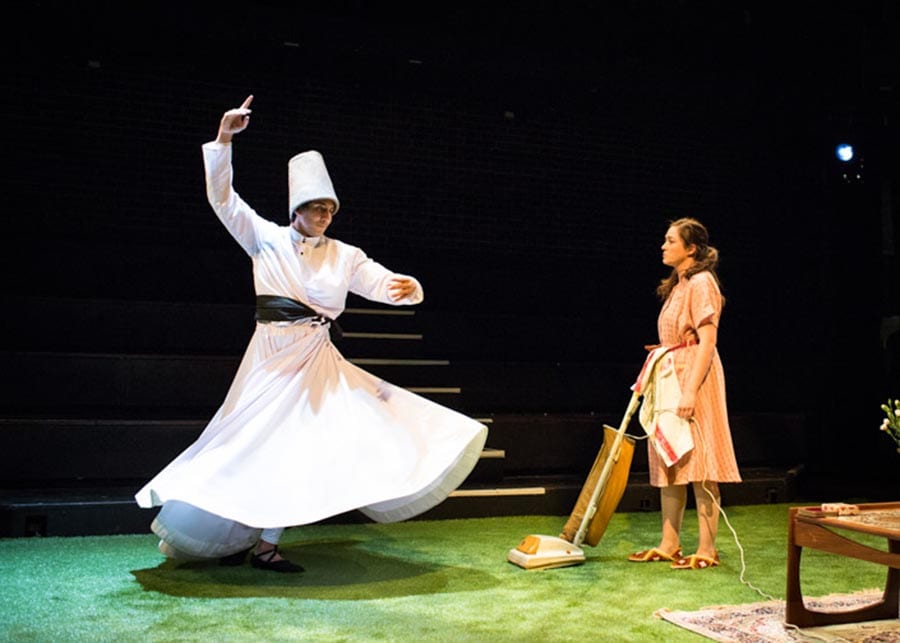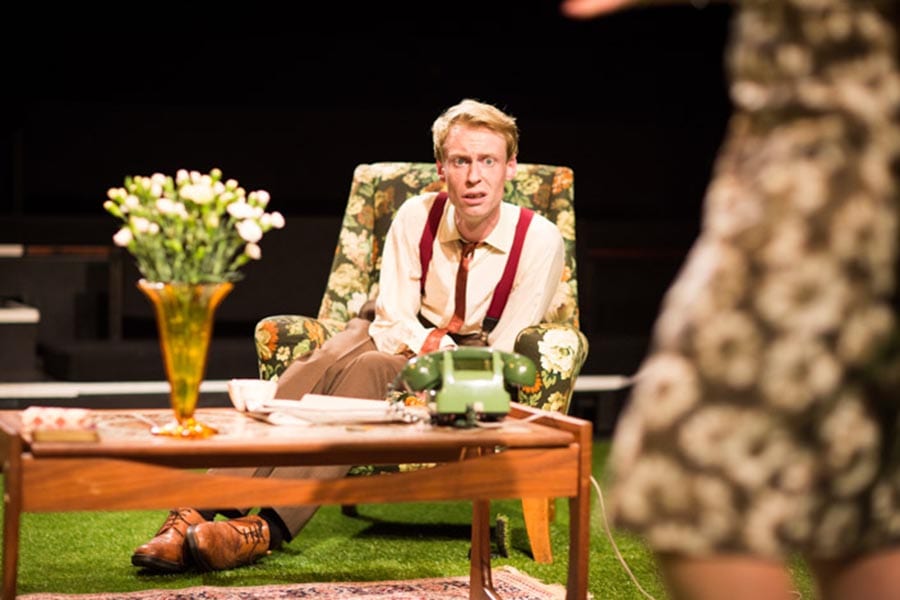This classic Egyptian play is one of the many productions focusing on Arab culture as part of the Shubbak Festival that is taking place in London this July. The Tree Climber is an Absurdist, whimsical play with an undercurrent of contextual subtext. It was written by one of the most highly regarded playwrights of the modern Arab world, Tawfiq Al-Hakim. Unfortunately, El-Alfy’s production failed to fulfill the complex script’s potential, leaving it to peak within the first twenty minutes and then slowly drag out for the remaining seventy.
This is not to say the production is without its merits. The performance’s pre-set is wonderful. As one takes their seat, they are met with a visual and auditory onslaught from the sound of an elderly hoover and the artful dancing of the Whirling Dervish, who Wallas Hamonde plays skillfully and hypnotically.
John Game’s anxious detective and Merce Ribot’s maid brighten the stage. Their charisma, comic timing and watchable energy lift the pace and quality of the production. Game sweats as he dynamically paces across the Cockpit’s stage, colouring the text dexterously. Ribot’s maid speaks hurriedly in Spanish, frantically cleaning and fetching whiskey for her visitors. Ribot is clearly at ease on the stage, and she continually uses her talents to arouse appreciative giggles in the audience.
However, whenever Game and Ribot exit, the play becomes, for the most part, slow and uninteresting. Tension fails to build, lines are delivered flatly and bodies positioned woodenly. Perhaps El-Alfy is not to blame for this, for the in-the-round space was used adeptly and, at points, rather imaginatively.
The script itself is masterful, with Pinteresque pauses and artful self-awareness (‘Its time for a flashback’). Perhaps a weak translation is responsible for the stilted nature of this production or maybe there is simply a lack of understanding from a contemporary, Western audience. The blurb of the play’s description reads ‘It’s all about the lizard’; but the production fails to live up to this absurdist element of the original text. The production seems unclear of the metaphorical significance of the lizard, or if the cast and crew are aware, they fail to communicate it effectively. Perhaps a metaphor for ex-pats colonizing land? Or a stand against the silencing of women in Arabic countries? Perhaps not, seeing as Al-Hazeem developed the nickname ‘Adu al Mar’a’, meaning ‘enemy of woman’.
Indeed, most of the underlying metaphors and motifs, although poetically beautiful, lack any deeper significance in this adaptation. If ambiguity is what they are aiming for, an addition of a simple paragraph in the production’s flyer could illuminate the political and social relevancy and make the audience more understanding and thus more appreciative of this contextually layered and complex play.
The play is famous for its use of literary language in the guise of dialogue. This mystical, fairy-tale like quasi-verse plays a vital role in forming the absurdist world of the play, but in this production it failed to reach that potential. In the climactic scene between husband and wife, the lack of communication should have forced the company to delve into the un-said subtext. If they did do this, it is not communicated at all. Perhaps a stronger cast and a more informed audience would have made this production more watchable and allow the company to fulfill the obvious potential the script has to offer. While the aesthetic elements of the Absurdist genre are explored, the intellectual are left unclear and foggy.
Its fantastic that the El-Alfy Theatre is bridging the gap between theatre in Egypt and London, and hopefully the initiative continues to expand, but perhaps with a few amendments.



